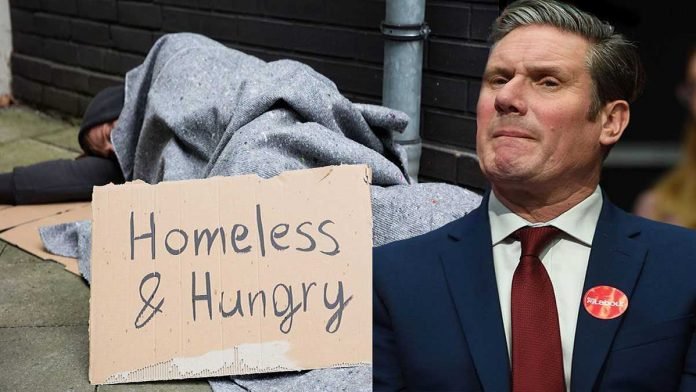How Labour’s leadership candidates responded to council housing pledges
At the heart of the housing crisis in England is the failure of successive governments to build enough social rent council homes. We all see the impacts of this failure every day, in the harrowing statistics on housing and homelessness, in the cases that we see on the television, and with the increasing amounts of rough sleepers that we see on our daily commutes. The party must take significant steps to ensure that any future Labour government tackles the housing crisis head-on.
Council responses to a freedom of information (FoI) request show nearly 25,000 people were recorded sleeping rough at least once in England during the latest year on record, according to the BBC.
Despite Long-Bailey and Nandy responding and backing the call for more social housing the shadow Brexit Secretary Sir Keir owning a £1.75million house in Camden, North London, as well as part- owning a £600,000 home in Oxted, Surrey. He said he bought it for his sister’s family and received no rent. Has not backed the call and promise of more social housing asked for by the Labour Campaign for Council Housing.
Last year, to ensure that a Labour government would end the housing crisis once and for all, the Labour Campaign for Council Housing played a key role in shaping the housing policy for our 2019 general election manifesto. The result was a set of ambitious manifesto commitments that put council housing back at the heart of Labour’s housing policy:
- To build at an annual rate of at least 150,000 social rent homes per year, with 100,000 of these being built by councils for social rent, by the end of the parliament;
- To end the Right-to-Buy policy;
- To provide a £75bn infrastructure fund to deliver these homes, over five years.
We are all bitterly disappointed with how the 2019 general election ended, but that should not mean that our ambition to end the housing crisis ends as well. As a result, LCCH wrote to all Labour leadership and deputy leadership candidates asking them to commit to retaining Labour’s commitments on council housing.

We believe that it is important for members to know what their next leader’s political priorities are, and whether making a material impact on housing and homelessness in England is one of them. When you consider that housing was top of the constituency Labour parties’ priorities ballot at the 2019 Labour conference, this takes even more importance in the context of the leadership elections.
In this regard, it is hugely encouraging to see such a positive response over the last two weeks. Both Rebecca Long-Bailey and Lisa Nandy have responded to LCCH, by re-committing to a policy of building 100,000 social rent council homes per year. This is a hugely welcome commitment, and we commend the fact that both Long-Bailey and Nandy recognise that the solution to the housing crisis is building more housing that is affordable for everyone, everywhere.
At the time of writing, Sir Keir Starmer has yet to make that promise. He’s seen the effects of the housing crisis first hand in his home constituency and has worked hard to tackle homelessness in his campaigning.
The LCCH has called on Starmer to follow in the footsteps of his fellow candidates and back the proposals.
“To publicly back a large-scale council housebuilding programme is a chance to cement these promises within a policy commitment,” they said. “We do hope to hear from his campaign soon and hope that he continues to publicly back such a programme if elected as leader of the party.”
All candidates for Deputy Leader have backed the commitments showing that, once again, although the party has faced plenty of disputes, it is more or less united on key policy. According to data from Shelter, around one in 200 people in England are homeless or stuck in temporary accommodation. More than a million people are stuck on the waiting list for social housing, how can this be acceptable in 2020, in the world 6th largest economy?
Research conducted by the housing charity Shelter outlined that 280,000 people were recorded as homeless in England last year. This means that one in every 200 people in England are homeless, sleeping on streets, or stuck in temporary accommodation. More than one million households are on waiting lists for a social home.
Looking beyond any internal division, this leadership election is an opportunity for all candidates to publicly commit to ending the housing crisis through a large-scale council housebuilding programme, and we are glad to see such a positive response so far.
Related Articles:
Support Independent Journalism Today
Our unwavering dedication is to provide you with unbiased news, diverse perspectives, and insightful opinions. We're on a mission to ensure that those in positions of power are held accountable for their actions, but we can't do it alone. Labour Heartlands is primarily funded by me, Paul Knaggs, and by the generous contributions of readers like you. Your donations keep us going and help us uphold the principles of independent journalism. Join us in our quest for truth, transparency, and accountability – donate today and be a part of our mission!
Like everyone else, we're facing challenges, and we need your help to stay online and continue providing crucial journalism. Every contribution, no matter how small, goes a long way in helping us thrive. By becoming one of our donors, you become a vital part of our mission to uncover the truth and uphold the values of democracy.
While we maintain our independence from political affiliations, we stand united against corruption, injustice, and the erosion of free speech, truth, and democracy. We believe in the power of accurate information in a democracy, and we consider facts non-negotiable.
Your support, no matter the amount, can make a significant impact. Together, we can make a difference and continue our journey toward a more informed and just society.
Thank you for supporting Labour Heartlands












